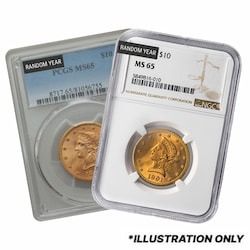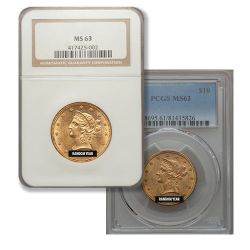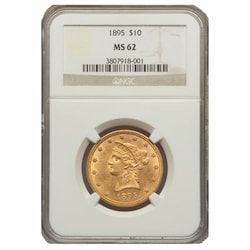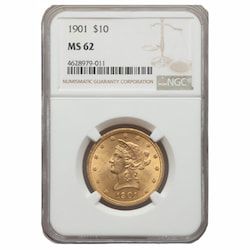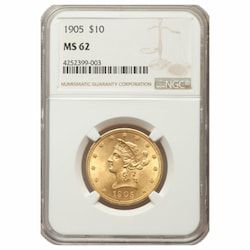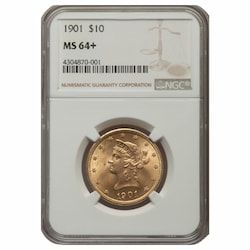$10 Dollar Liberty Gold Coin
The 10-dollar Liberty Coin was one of the most elusive pieces of coinage ever produced in the United States. Carrying a face value of $10, this gold coin reflects the sentiment of a past era when gold was still present in circulating coins.
History and Design
The Liberty Head design, also known as the coronet head, was adopted to feature the $10 Dollar Gold Coins issued from 1838 until 1907. It was released after a 34-year hiatus without gold coins in the country and made possible thanks to the vast supply mined during the California gold rush.
Christian Gobrecht designed both the obverse and reverse; his Liberty motif was inspired by the portrait of Venus in the famous 1809 painting Omnia Vincit Amor (Love Conquers All) by Benjamin West.
The coin's obverse depicts Lady Liberty with her hair secured in a bun by a string of beads and wearing a coronet inscribed with LIBERTY. Thirteen stars encircle the rim, while the date is placed below.
The reverse shows a heraldic eagle with a shield on its chest, holding an olive branch and arrows. The eagle imagery is surrounded by the inscriptions UNITED STATES OF AMERICA and the denomination TEN D. (meaning ten dollars).
From 1866 through 1869, only Philadelphia and the increasingly important San Francisco branch (S) struck this new design. Production began at Carson City, Nevada (CC) in 1870 and continued through 1893. New Orleans (O) coins appeared in 1879, and the new Denver (D) facility began mintage in 1906.
Features and Variations
Centered Bust
The first 1838 and early 1839 $10 dollar gold coins have Liberty’s shoulder line sharply pointed and positioned between the twelfth and thirteenth star. In late 1839, however, Gobrecht reworked and centered the bust over the date.
Covered Ear
From 1838 to 1839, Liberty's hair covered her ears. This detail was changed in 1839 when a new design was inserted. The new look made Liberty's ear more apparent.
“No Motto” and “With Motto” Series
Civil War residual spiritual feelings left the population wanting to express their nationally. Only with the Coinage Act of March 3, 1865, was the American motto "IN GOD WE TRUST" ordered on U.S. gold and silver coins, first appearing on the gold Liberty in 1866.
Before the series ended in 1904, President Theodore Roosevelt demanded a new design for United States coins that could be changed without Congress authorization. Before his death in August 1907, Augustus Saint-Gaudens completed designs for the eagle ($10 piece) and double eagles.
Until 1907, the U.S. Mint released the 10-dollar Liberty with Motto, while the eagle design stayed the same until it was actually replaced entirely by the Indian Head Design in 1908.
Collectibility and Value
Condition
The coin's condition and grading significantly impact its prices. Collectors seek high-grade specimens, usually uncirculated coins, which command higher premiums than their circulated counterparts. Mint State coins, usually graded between MS60 and 70, have fewer signs of wear and some of their original lust.
Rarity
The mintage for Liberties was small, and most of the remaining ones didn’t survive the hoarding by citizens, the recall, and the melt downs of the 1930s. According to PCGS, a complete mint-state set of eagles from 1866-1880 is unlikely to be assembled. And to their historical significance, they might cost more than modern American eagles.
The rarity of specific dates and a particular mintmark increases some coins' desirability over others. Many Carson City coins are rare, with the 1870-CC being the rarest. The 1879-O, with only 1,500 coins minted, is particularly scarce. Several early S issues are also scarce to rarities.
Investment
The coins are composed of .900 gold and .100 copper. The value of a gold eagle coin is tied to the price of gold, but also to its numismatic relevance, making it an attractive option for both investors and collectors alike.
Private investors looking to diversify their portfolios have long favored gold bullion due to its historical stability and high appreciation potential.







